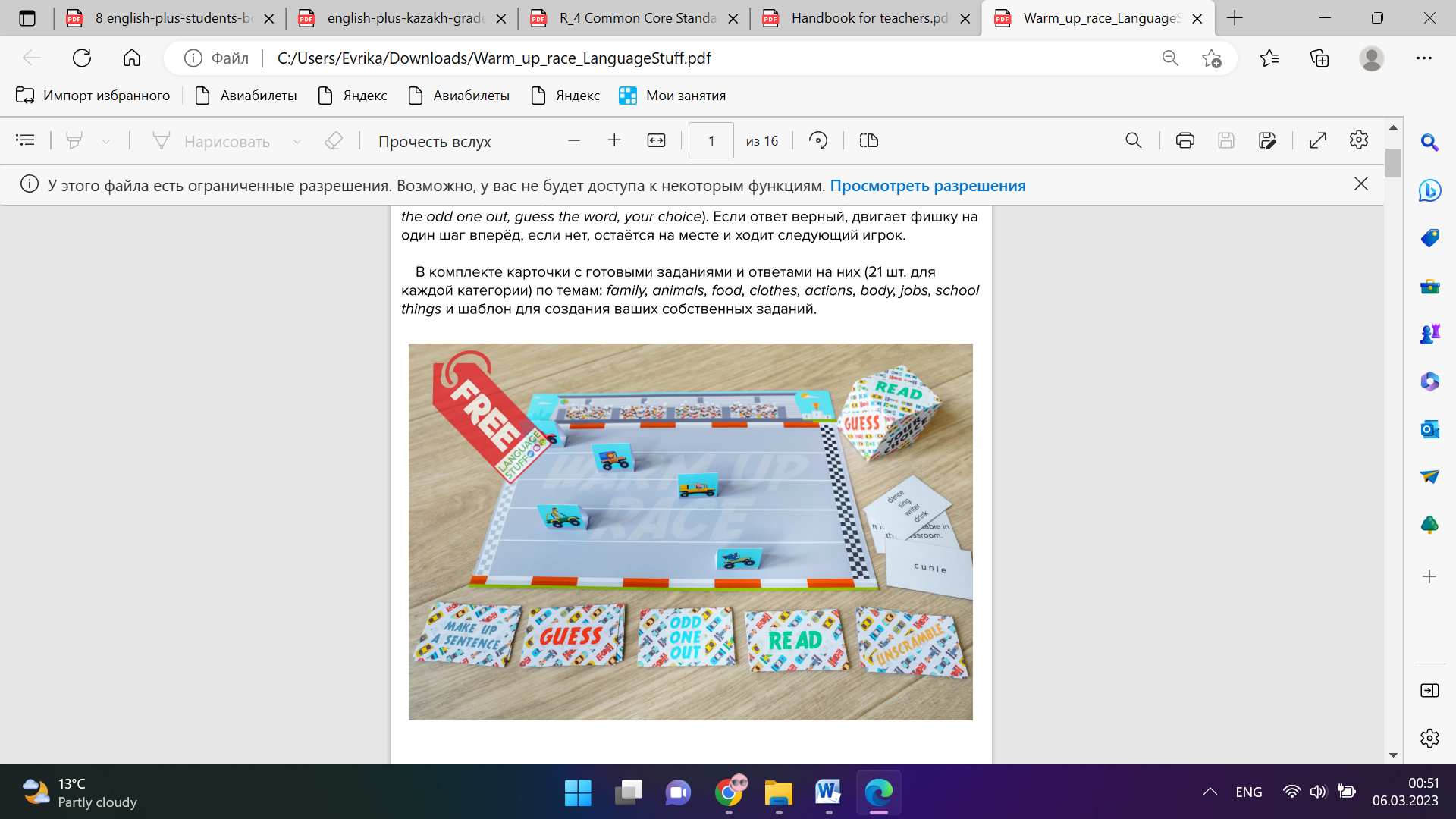
Short term plan: term 4
|
Unit: 2 Sports |
Lesson 81 |
||
|
Teacher name: |
|
||
|
Date: |
|
||
|
Grade: 5 |
Number present: |
absent: |
|
|
Lesson title |
I can describe people, places, things |
||
|
Learning objectives |
5.2.2.1 understand an increasing range of unsupported basic questions which ask for personal information; 5.3.4.1 respond with limited flexibility at sentence level to unexpected comments on an increasing range of general and curricular topics; 5.6.2.1 use appropriate adjectives and indefinite article a / an including common noun phrases describing things and activities on a limited range of familiar general and curricular topics. |
||
|
Lesson objectives |
Learners will be able to: • Learn and practise basic adjectives. • Learn how to use a and an correctly. |
||
|
Value links |
Hospitality: Traditionally a nomadic culture, hospitality has always been an important part of Kazakh culture. |
||
|
Plan |
|||
|
Stages / Time |
Teachers’ actions |
Students’ actions |
Assessment criteria |
Resources |
|
Beginning of the lesson 5 min |
Organization moment 1.Greeting. Ask about the weather. The teacher sets the lesson objectives, letting students know what to anticipate from the lesson. Warm-up
Fasten your seat belts and get ready for the all-round race Lead – In • Books closed. Ask the class to think about their town or city. In pairs, students should think of three words to describe it, e.g. big, small, etc. Allow them about 1 minute for this. • Get feedback from the class and write their suggestions on the board. |
Students' attention is drawn to the lesson. Students discuss the pictures in pairs. Determines the topic and aim of the lesson Students say different words from the picture |
Formative Assessment
Assessment criteria - Recognize basic personal questions without support - Provide unprepared speech to answer a variety of questions at sentence level with limited flexibility |
Pictures Student’s book |
|
Middle of the lesson Presentation part. 35 min |
Ex: 1 P:12 • Write treasure hunt on the board and translate it into the students’ own language. Ask the class if they know what it is. Elicit that a treasure hunt is when people use clues to find treasure or a prize. Ask if any of the students have ever been on a treasure hunt and elicit any feedback they provide. • In a weaker class, look at the example carefully together. You might also like to do the second clue together as a class before they continue in their pairs. .Ex: 2 P:12 • Write big and small on the board. Ask the students how these adjectives are connected and elicit that they have opposite meanings. • Encourage students to identify pairs of opposites that are easier first so that they will have fewer adjectives to guess from if they do not know. Students do the task in pairs. • Play the recording to check their answers as a class. Ex: 4 P:12 • Focus students’ attention on the examples and the rules. • In a stronger class, ask students to go ahead and complete the rules based on the examples. • In a weaker class, read the rules together and work out the answers as a class. Ex: 5 P:12 • Students complete the activity individually, using the rules from exercise 4 to help them if necessary. • Ask fast finishers to make more short descriptions using other adjectives from exercise 1with a and an. Conclusion during the lesson some tasks differentiated by outcomes of the students and by their abilities. |
Students do the adjectives Treasure Hunts. Answers: A big poster Differentiation: «Verbal support» method is used to help Students use new words in the text. Students look at the adjectives in exercise 1 and find five pairs of adjectives. The listen and check. Answers: (terrible – great; popular – unpopular; boring – interesting; difficult – easy) Students complete the rules with a and an Answers: 1 an 2 a Students complete with a or an Answers: 1 an 2 a 3 a 4 an 5 an 6 a 7 an 8 a |
Descriptor: - work in pairs - find a secret objects Total: 1 point Descriptor: - identify pairs of opposites - listen and check. Total: 1 point Descriptor: - complete the sentences Total: 1 point Descriptor: -write sentences -complete with a or an Total: 1 point |
flashcards Worksheets |
|
End of the lesson 5 min |
FEEDBACK Learners provide feedback on what they have learned at the lesson. |
|
Students evaluate each other and encourage classmate with phrases like: Well done! Brilliant! Good job! I like it! . |
Poster
|
жүктеу мүмкіндігіне ие боласыз
Бұл материал сайт қолданушысы жариялаған. Материалдың ішінде жазылған барлық ақпаратқа жауапкершілікті жариялаған қолданушы жауап береді. Ұстаз тілегі тек ақпаратты таратуға қолдау көрсетеді. Егер материал сіздің авторлық құқығыңызды бұзған болса немесе басқа да себептермен сайттан өшіру керек деп ойласаңыз осында жазыңыз
I can describe people, places, things
I can describe people, places, things
Short term plan: term 4
|
Unit: 2 Sports |
Lesson 81 |
||
|
Teacher name: |
|
||
|
Date: |
|
||
|
Grade: 5 |
Number present: |
absent: |
|
|
Lesson title |
I can describe people, places, things |
||
|
Learning objectives |
5.2.2.1 understand an increasing range of unsupported basic questions which ask for personal information; 5.3.4.1 respond with limited flexibility at sentence level to unexpected comments on an increasing range of general and curricular topics; 5.6.2.1 use appropriate adjectives and indefinite article a / an including common noun phrases describing things and activities on a limited range of familiar general and curricular topics. |
||
|
Lesson objectives |
Learners will be able to: • Learn and practise basic adjectives. • Learn how to use a and an correctly. |
||
|
Value links |
Hospitality: Traditionally a nomadic culture, hospitality has always been an important part of Kazakh culture. |
||
|
Plan |
|||
|
Stages / Time |
Teachers’ actions |
Students’ actions |
Assessment criteria |
Resources |
|
Beginning of the lesson 5 min |
Organization moment 1.Greeting. Ask about the weather. The teacher sets the lesson objectives, letting students know what to anticipate from the lesson. Warm-up
Fasten your seat belts and get ready for the all-round race Lead – In • Books closed. Ask the class to think about their town or city. In pairs, students should think of three words to describe it, e.g. big, small, etc. Allow them about 1 minute for this. • Get feedback from the class and write their suggestions on the board. |
Students' attention is drawn to the lesson. Students discuss the pictures in pairs. Determines the topic and aim of the lesson Students say different words from the picture |
Formative Assessment
Assessment criteria - Recognize basic personal questions without support - Provide unprepared speech to answer a variety of questions at sentence level with limited flexibility |
Pictures Student’s book |
|
Middle of the lesson Presentation part. 35 min |
Ex: 1 P:12 • Write treasure hunt on the board and translate it into the students’ own language. Ask the class if they know what it is. Elicit that a treasure hunt is when people use clues to find treasure or a prize. Ask if any of the students have ever been on a treasure hunt and elicit any feedback they provide. • In a weaker class, look at the example carefully together. You might also like to do the second clue together as a class before they continue in their pairs. .Ex: 2 P:12 • Write big and small on the board. Ask the students how these adjectives are connected and elicit that they have opposite meanings. • Encourage students to identify pairs of opposites that are easier first so that they will have fewer adjectives to guess from if they do not know. Students do the task in pairs. • Play the recording to check their answers as a class. Ex: 4 P:12 • Focus students’ attention on the examples and the rules. • In a stronger class, ask students to go ahead and complete the rules based on the examples. • In a weaker class, read the rules together and work out the answers as a class. Ex: 5 P:12 • Students complete the activity individually, using the rules from exercise 4 to help them if necessary. • Ask fast finishers to make more short descriptions using other adjectives from exercise 1with a and an. Conclusion during the lesson some tasks differentiated by outcomes of the students and by their abilities. |
Students do the adjectives Treasure Hunts. Answers: A big poster Differentiation: «Verbal support» method is used to help Students use new words in the text. Students look at the adjectives in exercise 1 and find five pairs of adjectives. The listen and check. Answers: (terrible – great; popular – unpopular; boring – interesting; difficult – easy) Students complete the rules with a and an Answers: 1 an 2 a Students complete with a or an Answers: 1 an 2 a 3 a 4 an 5 an 6 a 7 an 8 a |
Descriptor: - work in pairs - find a secret objects Total: 1 point Descriptor: - identify pairs of opposites - listen and check. Total: 1 point Descriptor: - complete the sentences Total: 1 point Descriptor: -write sentences -complete with a or an Total: 1 point |
flashcards Worksheets |
|
End of the lesson 5 min |
FEEDBACK Learners provide feedback on what they have learned at the lesson. |
|
Students evaluate each other and encourage classmate with phrases like: Well done! Brilliant! Good job! I like it! . |
Poster
|

шағым қалдыра аласыз




















